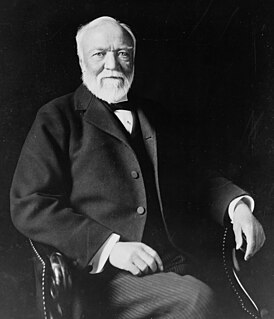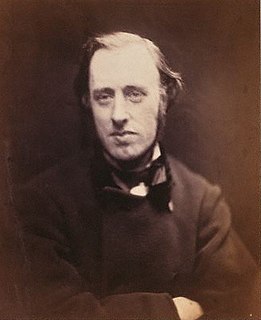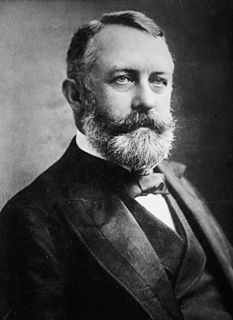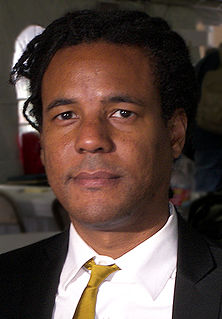
Andrew Carnegiekar-NAY-gee was a Scottish-American industrialist, business magnate, and philanthropist. Carnegie led the expansion of the American steel industry in the late 19th century and became one of the richest Americans in history. He became a leading philanthropist in the United States and in the British Empire. During the last 18 years of his life, he gave away $350 million to charities, foundations, and universities – almost 90 percent of his fortune. His 1889 article proclaiming "The Gospel of Wealth" called on the rich to use their wealth to improve society, and stimulated a wave of philanthropy.

Carnegie Mellon University (CMU) is a private research university based in Pittsburgh, Pennsylvania. Founded in 1900 by Andrew Carnegie as the Carnegie Technical Schools, the university became the Carnegie Institute of Technology in 1912 and began granting four-year degrees. In 1967, the Carnegie Institute of Technology merged with the Mellon Institute of Industrial Research to form Carnegie Mellon University. With its main campus located 3 miles (5 km) from Downtown Pittsburgh, Carnegie Mellon has grown into an international university with over a dozen degree-granting locations in six continents, including campuses in Qatar and Silicon Valley, and more than 20 research partnerships.

Andrew Lang was a Scottish poet, novelist, literary critic, and contributor to the field of anthropology. He is best known as a collector of folk and fairy tales. The Andrew Lang lectures at the University of St Andrews are named after him.

Andrew Dickson White was an American historian and educator, who was the cofounder of Cornell University and served as its first president for nearly two decades. He was known for expanding the scope of college curricula. A politician, he had served as state senator in New York. He was later appointed as a US diplomat to Germany and Russia, among other responsibilities.

Carnegie Hall is a concert venue in Midtown Manhattan in New York City, United States, located at 881 Seventh Avenue, occupying the east side of Seventh Avenue between West 56th Street and West 57th Street, two blocks south of Central Park.

John Pierpont Morgan Sr. was an American financier and banker who dominated corporate finance on Wall Street throughout the Gilded Age. As the head of the banking firm that ultimately became known as J.P. Morgan and Co., he was a driving force behind the wave of industrial consolidation in the United States spanning the late 19th and early 20th century.

Edgar Lawrence Doctorow was an American novelist, editor, and professor, best known internationally for his works of historical fiction. He has been described as one of the most important American novelists of the 20th century.

William Edward Hartpole Lecky was an Irish historian, essayist, and political theorist with Whig proclivities. His major work was an eight-volume History of England during the Eighteenth Century.

David Raymond Sedaris is an American humorist, comedian, author, and radio contributor. He was publicly recognized in 1992 when National Public Radio broadcast his essay "Santaland Diaries". He published his first collection of essays and short stories, Barrel Fever, in 1994. He is the brother and writing collaborator of actor Amy Sedaris.

Henry Clay Frick was an American industrialist, financier, union-buster, and art patron. He founded the H. C. Frick & Company coke manufacturing company, was chairman of the Carnegie Steel Company, and played a major role in the formation of the giant U.S. Steel manufacturing concern. He also financed the construction of the Pennsylvania Railroad and the Reading Company, and had extensive real estate holdings in Pittsburgh and throughout the state of Pennsylvania. He later built the historic neoclassical Frick Mansion, and upon his death donated his extensive collection of old master paintings and fine furniture to create the celebrated Frick Collection and art museum. However, as a founding member of the South Fork Fishing and Hunting Club, he was also in large part responsible for the alterations to the South Fork Dam that caused its failure, leading to the catastrophic Johnstown Flood. His vehement opposition to unions also caused violent conflict, most notably in the Homestead Strike.

"Wealth", more commonly known as "The Gospel of Wealth", is an article written by Andrew Carnegie in June of 1889 that describes the responsibility of philanthropy by the new upper class of self-made rich. Carnegie proposed that the best way of dealing with the new phenomenon of wealth inequality was for the wealthy to utilize their surplus means in a responsible and thoughtful manner. This approach was contrasted with traditional bequest (patrimony), where wealth is handed down to heirs, and other forms of bequest e.g. where wealth is willed to the state for public purposes. Benjamin Soskis, a historian of philanthropy, refers to the article as the 'urtext' of modern philanthropy.

A Carnegie library is a library built with money donated by Scottish-American businessman and philanthropist Andrew Carnegie. A total of 2,509 Carnegie libraries were built between 1883 and 1929, including some belonging to public and university library systems. 1,689 were built in the United States, 660 in the United Kingdom and Ireland, 125 in Canada, and others in Australia, South Africa, New Zealand, Serbia, Belgium, France, the Caribbean, Mauritius, Malaysia, and Fiji.

Colson Whitehead is an American novelist. He is the author of six novels, including his debut work, the 1999 novel The Intuitionist, and The Underground Railroad (2016), for which he won the 2016 National Book Award for Fiction and the 2017 Pulitzer Prize for Fiction. He has also published two books of non-fiction. In 2002, he received a MacArthur Fellowship.

Vartan Gregorian is an American academic, serving as the president of Carnegie Corporation of New York.
David Quammen is an American science, nature and travel writer and the author of fifteen books. He wrote a column called "Natural Acts" for Outside magazine for fifteen years. His articles have also appeared in National Geographic, Harper's, Rolling Stone, the New York Times Book Review and other periodicals. In 2013, Quammen's book Spillover was shortlisted for the PEN/E. O. Wilson Literary Science Writing Award.
Jill Lepore is an American historian. She is the David Woods Kemper ’41 Professor of American History at Harvard University and a staff writer at The New Yorker, where she has contributed since 2005. She writes about American history, law, literature, and politics.

The Andrew Carnegie Medals for Excellence in Fiction and Nonfiction were established in 2012 to recognize the best fiction and nonfiction books for adult readers published in the U.S. in the previous year. They are named in honor of nineteenth-century American philanthropist Andrew Carnegie in recognition of his deep belief in the power of books and learning to change the world. The award is supported by the Carnegie Corporation of New York and administered by the American Library Association (ALA). Booklist and the Reference and User Services Association (RUSA) cosponsor the awards. The shortlist and winners are selected by a seven-member selection committee of library experts who work with adult readers. The annually appointed selection committee includes a chair, three Booklist editors or contributors, and three former members of RUSA CODES Notable Books Council.
The following is a timeline of the history of the city of Pittsburgh, Pennsylvania, US.

A public library is a library that is accessible by the general public and is generally funded from public sources, such as taxes. It is operated by librarians and library paraprofessionals, who are also civil servants.
As of 2018, several firms in the United States rank among the world's biggest publishers of books in terms of revenue: Cengage Learning, HarperCollins, Houghton Mifflin Harcourt, McGraw-Hill Education, Scholastic, Simon & Schuster, and Wiley.















